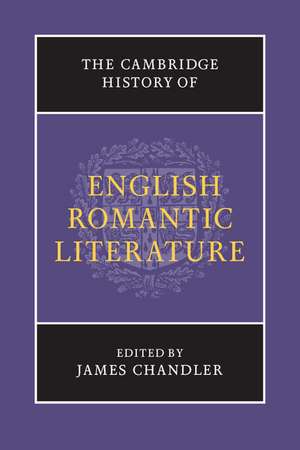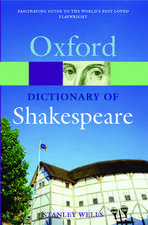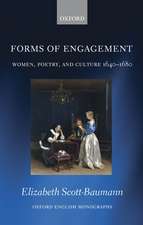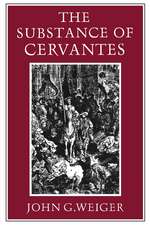The Cambridge History of English Romantic Literature: The New Cambridge History of English Literature
Editat de James Chandleren Limba Engleză Paperback – 18 iul 2012
| Toate formatele și edițiile | Preț | Express |
|---|---|---|
| Paperback (1) | 499.71 lei 6-8 săpt. | |
| Cambridge University Press – 18 iul 2012 | 499.71 lei 6-8 săpt. | |
| Hardback (1) | 1155.01 lei 6-8 săpt. | |
| Cambridge University Press – 4 mar 2009 | 1155.01 lei 6-8 săpt. |
Preț: 499.71 lei
Nou
Puncte Express: 750
Preț estimativ în valută:
95.62€ • 100.09$ • 79.59£
95.62€ • 100.09$ • 79.59£
Carte tipărită la comandă
Livrare economică 31 martie-14 aprilie
Preluare comenzi: 021 569.72.76
Specificații
ISBN-13: 9781107629196
ISBN-10: 1107629195
Pagini: 796
Dimensiuni: 152 x 228 x 35 mm
Greutate: 1.25 kg
Editura: Cambridge University Press
Colecția Cambridge University Press
Seria The New Cambridge History of English Literature
Locul publicării:New York, United States
ISBN-10: 1107629195
Pagini: 796
Dimensiuni: 152 x 228 x 35 mm
Greutate: 1.25 kg
Editura: Cambridge University Press
Colecția Cambridge University Press
Seria The New Cambridge History of English Literature
Locul publicării:New York, United States
Cuprins
General introduction James Chandler; Part I. The Ends of Enlightenment: 1. Sentiment and sensibility John Brewer; 2. Antiquarianism, balladry, and the rehabilitation of romance Susan Manning; 3. The Romantics and the political economists Catherine Gallager; 4. The problem of periodisation: Enlightenment, Romanticism, and the fate of system Clifford Siskin; Part II. Geographies: The Scenes of Literary Life: 5. London in the 1790s John Barrell; 6. Edinburgh and lowland Scotland Ian Duncan; 7. Romantic Ireland: 1750–1845 Luke Gibbons; 8. France, Germany, America David Simpson; 9. The 'Warm South' Esther Schor; 10. Country matters W. J. T. Mitchell; 11. Romanticism and the wider world: poetry, travel literature and Empire Nigel Leask; 12. The homes of England Margot Finn; 13. Writing, reading and the scenes of war Mary A. Favret; 14. Regency London Simon During; Part III. Histories: Writing in the New Movements: 15. Rebellion, revolution, reform: the transit of the intellectuals Anne Janowitz; 16. Changes in the world of publishing Adrian Johns; 17. The new poetries Susan J. Wolfson; 18. Romanticism and poetic autonomy Paul Hamilton; 19. Transformations of the novel – I Deidre Lynch; 20. Transformations of the novel – II Ina Ferris; 21. Theatre, performance, and urban spectacle Julie Carlson; 22. The epigenesis of genre: new forms from old Tilottama Rajan; 23. The literature of the new sciences Jan Golinski; 24. The making of child readers Katie Trumpener; Part IV. The Ends of Romanticism: 25. Representation restructured Frances Ferguson; 26. Romantic cultural Imperialism Saree Makdisi; 27. Romanticism and religious modernity: from natural supernaturalism to literary sectarianism Kevin Gilmartin; 28. Is Romanticism finished? Jerome McGann; Chronology; Bibliographies; Index.
Recenzii
'Fifty years ago, literary studies was awash in big theories of Romanticism, created by the likes of M. H. Abrams, Geoffrey Hartman, and Harold Bloom; two decades later, Marilyn Butler argued that the very label 'Romantic' was 'historically unsound'. This collection suggests that no consensus has yet emerged: instead, the best of the essays suggest continuities with periods before and after. Rather than big theories, the contributors present kaleidoscopic snapshots of individual genres (the novel, the 'new poetry', drama, the ballad, children's literature); larger intellectual currents (John Brewer writes exceptionally well on 'sentiment and sensibility'); currently fashionable topics (imperialism, publishing history, disciplinarity); and - most interesting - the varying cultures of discrete localities (London, Ireland, Scotland). The result is an excellent book useful … for its summaries of early twenty-first-century thinking about British literary culture from the 1770s to the 1830s.' Choice
Descriere
An engaging account of literary production around the turn of the nineteenth century, now available in paperback.

































